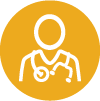What happens at the end of cancer treatment?
Upon completion of cancer treatment, your physician will review the following:
- Prevention of new or recurrent cancers
- Prevention of late effects of cancer and treatment
- Routine testing for the return of a cancer (surveillance)
- Routine testing for new cancers (screening)
- Assessment and treatment of late effects of cancer and treatment
- Coordinated care between providers
- Planning for ongoing survivorship care
How long does it take to recover from cancer treatment?
Your cancer experience is unique to you. When it comes to your diagnosis, treatment, and survivorship plan, one size does not fit all. Many effects of treatment quickly resolve after treatment ends. Long-term effects start during treatment and persist after treatment is done. Less often, effects start long after treatment has ended. During health visits, your health care providers will assess you for such late effects. They will provide treatment for late or long-term effects as needed. The first few months will be a time of change. Give yourself time to adapt to these changes and establish your new ‘normal’.
Will my health return to how it was before treatment?
When treatment ends, some survivors are able to close that particular chapter of their lives, readjust to a new normal and, for the most part, do not experience any major health issues related to their experience with the disease. Others, however, experience side effects of treatment that last beyond the end of their therapy regimen. Some of these side effects can last days, weeks, months, or even years. As you transition from active treatment to post treatment, you may find that returning to the way life used to be may be difficult. Recovery (both, physical and mental) takes a great amount of patience, as your body may feel the aftermath long after treatment has ended.
How can I explain my recovery to others?
There is no right way to deal with others about your illness, but you do need to think about what you will say when you are on the road to recovery. Some survivors do not want to focus on their cancer or be linked in people’s minds with the disease. Others are very open about it, speaking frankly about concerns, clarifying wrong ideas, and deciding how to move forward. The many people in your life will respond differently to your cancer. Families and friends are often not prepared for the fact that recovery takes time. In general, your recovery will take much longer than your treatment did. Give yourself time. Let others know how you feel, what you are able to do as you heal, and what not to expect.
Is there anything I can do to prevent cancer recurrence?
You can reduce your risk of cancer with healthy living. Healthy living includes physical activity, eating well, and not using tobacco. Less often, there are medical treatments to prevent cancer. Some people have surgery to remove a body part, like a breast, where cancer is likely to start. Some people take medication to lower hormone levels to reduce the chance of getting cancer. Your doctor will discuss these options if they apply to you.
Surveillance, or routine checking for a recurrence, often includes updating your health history, a physical exam, and in some cases blood tests or diagnostic scans.
Survivors have a higher risk of a new (second) cancer. Ask your health care provider about your chance of getting a second cancer and do your best to stay on track with any recommended screenings. If needed, genetic testing can confirm if you are at risk for a hereditary cancer.
What kind of support is available for cancer survivors?
There are many different resources available for cancer patients and these resources cover a variety of needs such as survivorship education (guidelines for screenings, cancer prevention, late effects, and supportive care), support groups, counseling, and financial resources. The following are some of the commonly utilized support resources:
- National Cancer Institute
- American Cancer Society
- Patient Advocate Foundation
- Centers for Medicare & Medicaid Services
- Cancer Survivors Network
- CancerCare
- Livestrong

For more information, visit https://www.cancer.gov/about-cancer/coping/survivorship. This information is recommended by Amber Shearer, a nurse navigator at United Hospital Center. Learn more about the support provided by nurse navigators by visiting http://wvcancercenter.com/nurse-navigator/.
Please note, the information provided throughout this site is not intended or implied to be a substitute for professional medical advice, diagnosis or treatment. All content, including text, graphics, images, and video, on or available through this website is for general information purposes only. If you are experiencing related symptoms, please visit your doctor or call 9-1-1 in an emergency.

